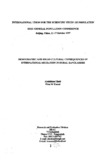| dc.contributor.author | Hadi, Abdullahel | |
| dc.contributor.author | Kamal, F. M. | |
| dc.date.accessioned | 2019-11-04T15:30:38Z | |
| dc.date.available | 2019-11-04T15:30:38Z | |
| dc.date.issued | 1997-10 | |
| dc.identifier.citation | Hadi, A., & Kamal, F. M. (1997, October). Demographic and socio-cultural consequences of international migration in rural Bangladesh. Research Reports (1997): Social Studies, Vol – XVI, 1–16. | |
| dc.identifier.uri | http://hdl.handle.net/10361/12848 | |
| dc.description.abstract | This research examines demographic and socio-cultural consequences of south-north migration in the south at the
family-level Using data from a nationally representative sample survey of 1,030 families in Bangladesh, the study
argues that temporary migrants from the south to the north influence their left behind families by raising living
standard and modifying the cultural behaviors through interacting northern ideas with the southern traditions. The
demographic consequences of emigration are felt negligible when people keep moving in a wider span of time from a
community. Findings reveal that financial and social aspects of international migration affect health behavior and
mortality, nuptiality and practice of dowry, women's work and seclusion, living arrangement and decision-making
role: The study concludes that south-north migration can be an important determinant of social change in the south
when financial capacity and modem exposures work synergistically with the traditional values of the south. | en_US |
| dc.language.iso | en | en_US |
| dc.publisher | BRAC Research and Evaluation Division (RED) | en_US |
| dc.subject | Migration | en_US |
| dc.subject | Dowry | en_US |
| dc.subject | Female seclusion | en_US |
| dc.subject.lcsh | Bangladesh--Social conditions. | |
| dc.subject.lcsh | Migration, Internal--Bangladesh. | |
| dc.title | Demographic and socio-cultural consequences of international migration in rural Bangladesh | en_US |
| dc.type | Research report | en_US |

